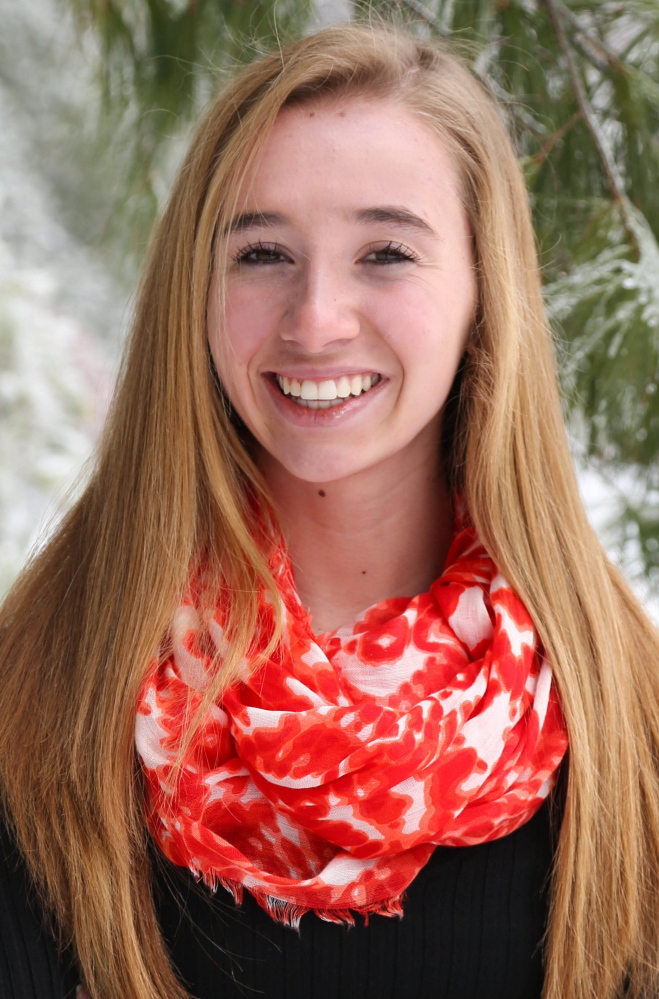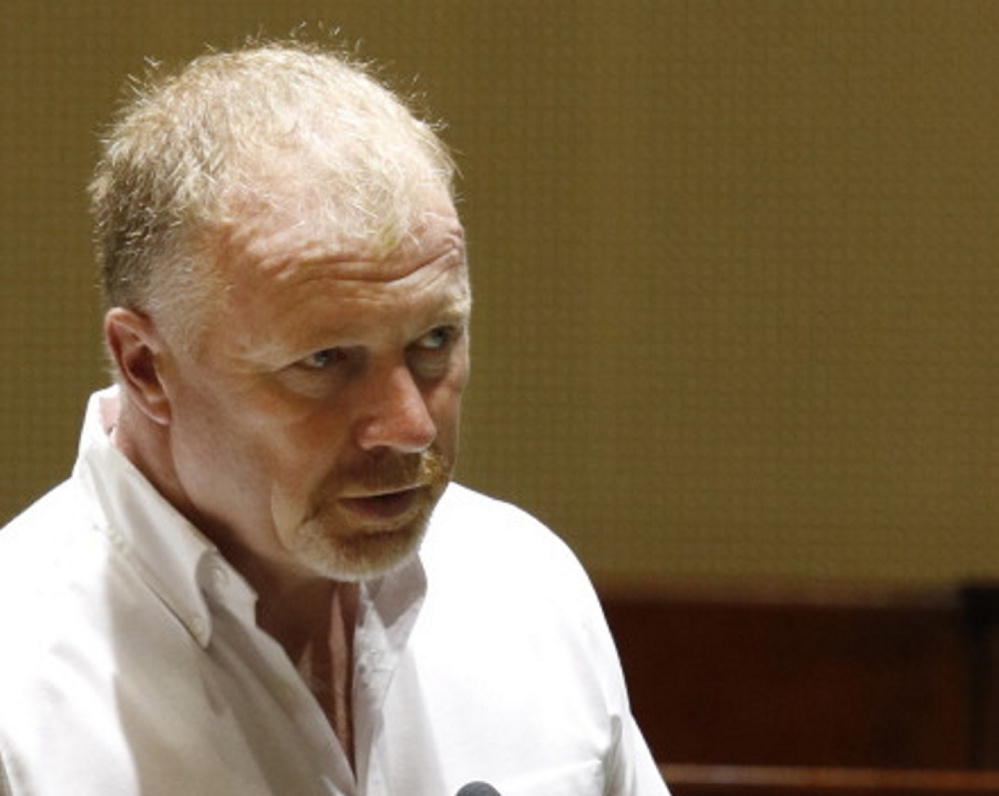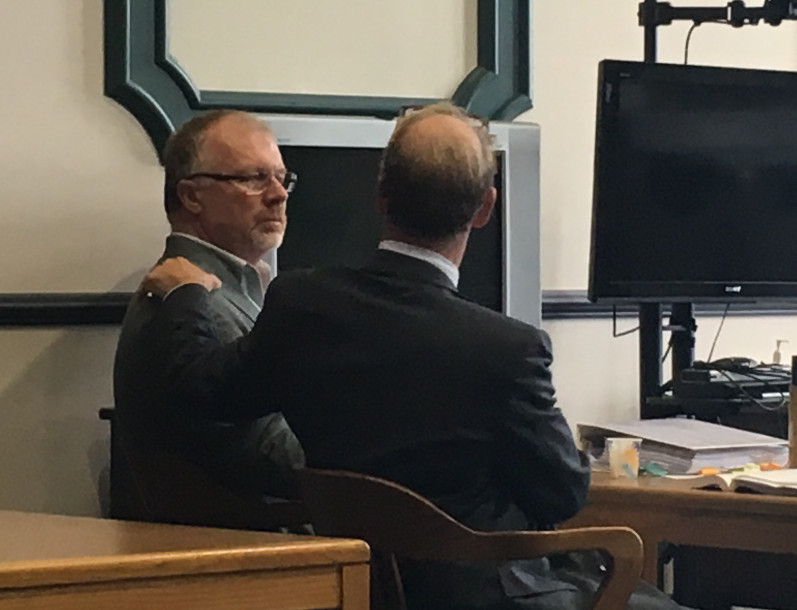BATH — A Sagadahoc County jury on Tuesday found David Brown not guilty of reckless conduct in connection with a fatal hayride crash in 2014 that resulted in the death of an Oakland teenager.
The jury of seven women and five men deliberated for more than two hours before clearing Brown, a 56-year-old South Paris man, of the misdemeanor charge in the first of three criminal trials resulting from the accident.
Brown, who drove the Jeep pulling the hayride wagon, had been on trial since late last week. If convicted, he could have been sentenced to up to 364 days in jail and a $2,000 fine for a class D misdemeanor.
When the verdict came down, Brown, who wore a gray sport coat and khakis Tuesday and was joined throughout the trial by a group of friends and family members, showed little in the way of relief.
“I have mixed emotions,” Brown said in an interview with reporters shortly afterward. “There’s no winners here. There’s no victory celebration going on. There’s been nothing but harm for a lot of people. I just know what I experienced that night.”
Brown was charged with the misdemeanor after investigators determined that a mechanical failure in the 1979 CJ-5 Jeep he was driving that night at a Mechanic Falls farm led the hayride to plummet down a gravel slope and crash into a tree.
A 17-year-old Oakland girl, Cassidy Charette, died in the accident, while more than 20 others were injured, including Brown himself, who had broken ribs and suffered a concussion.
“The hardest part has been living with the fact that we lost the young girl,” Brown said after the trial.
Though his criminal charge is cleared, Brown is one of three people named in a wrongful death lawsuit filed by the Charette family.
The others named in that lawsuit are Peter Bolduc, owner of Harvest Hill Farms, and Philip Theberge, a mechanic at the farm.
A grand jury also has indicted Theberge on a charge of reckless conduct and Harvest Hill Farms — which has since filed for bankruptcy — on charges of manslaughter, aggravated assault, driving to endanger and reckless conduct.
After Brown was found not guilty Tuesday, the attorney for the Charette family, Jodi Nofsinger of Berman & Simmons, released a statement expressing her disappointment about the outcome but gratitude to the prosecutors, judge and jurors.
“Our focus remains on the civil lawsuit,” Nofsinger wrote. “‘Not guilty’ in a criminal case does not mean ‘not responsible’ in the civil justice system. The proof necessary to find a person guilty of a crime is very different than to hold him responsible in a civil lawsuit for failing to follow basic safety rules. From the information we already have about the hayride tragedy, we believe our wrongful death case is strong and that all the defendants will be held accountable.”
Brown said he is still troubled by the fatal accident and sees a counselor. Despite the lawsuit, he said would like to connect with the Charette family one day.
“I can’t say too much about it,” he said. “They probably don’t care how I feel, but at some point I’d really like to be able to reach out to the family.”
In the trial this week and last, prosecutors from Androscoggin County were trying to prove that Brown, who has a class B commercial driver’s license and still works as a professional driver, consciously disregarded the risks associated with the four-wheel drive, automatic shift vehicle he operated that night and put its passengers at bodily risk.
In his closing arguments Tuesday, James Andrews, a deputy district attorney, referred to the testimony of several investigators and mechanical experts who studied the Jeep and the accident scene and were not able to find concrete evidence of sudden brake failure.
The brakes had deteriorated over time and the danger of using them on a steep slope while towing a heavy trailer would have been obvious to a driver such as Brown, who regularly checks the brakes on his own truck, Andrews argued.
Andrews also referred to testimony by several coworkers and investigators who heard Brown express concern about the brakes and the load on the hayride — statements Brown said he doesn’t recall or made in jest.
“It was a storm that was not difficult to forecast,” Andrews said on Tuesday. There were “huge thunder clouds forming in the sky. Any reasonable person should have seen it coming.”
But in testimony Monday and Tuesday, Brown said he was not aware of any brake problems on the Jeep before the accident.
In closing remarks Tuesday, his attorney, Allan Lobozzo, pointed out that a day before the accident, Brown had mentioned a problem in the Jeep’s carburetor to mechanics at the farm, and it was addressed promptly.
Before the 12 jurors left to deliberate, Lobozzo repeatedly asked them to consider whether a man such as Brown would have “thrown caution to the wind” and operated a vehicle he knew was going to have brake failure.
“Mr. Brown could not have in any way anticipated the forces that came together that night (of the accident),” Lobozzo said.
On Monday, Lobozzo called to the stand a civil engineering professor from the University of Maine, in Orono, who said the Jeep could have continued to tow the hayride down the steepest part of the hill where it crashed had it not been for the failure of the front brakes.
Lobozzo also called Maine State Fire Marshal Joseph Thomas to testify that Maine does not regulate the operation of recreational hayrides — though there have been efforts to regulate them since the 2014 crash.
“I would suggest that the evidence of the state could be dubbed the hubris of hindsight,” Lobozzo said in his closing remarks. Brown, he continued, has been prosecuted “for violating a standard that does not exist.”
The trial was moved to Sagadahoc County Superior Court in Bath because of extensive news media attention to the case in Androscoggin County.
Before the jurors recessed, Androscoggin County Superior Court Justice MaryGay Kennedy reminded them that Brown was presumed innocent under the justice system and that prosecutors had to prove beyond a reasonable doubt that he was guilty of the reckless conduct charge.
“The state just failed to make its case,” one of the jurors, David Hills of Bath, told reporters after the trial. “Not beyond a reasonable doubt.”
Charles Eichacker — 621-5642
Twitter: @ceichacker
Send questions/comments to the editors.






